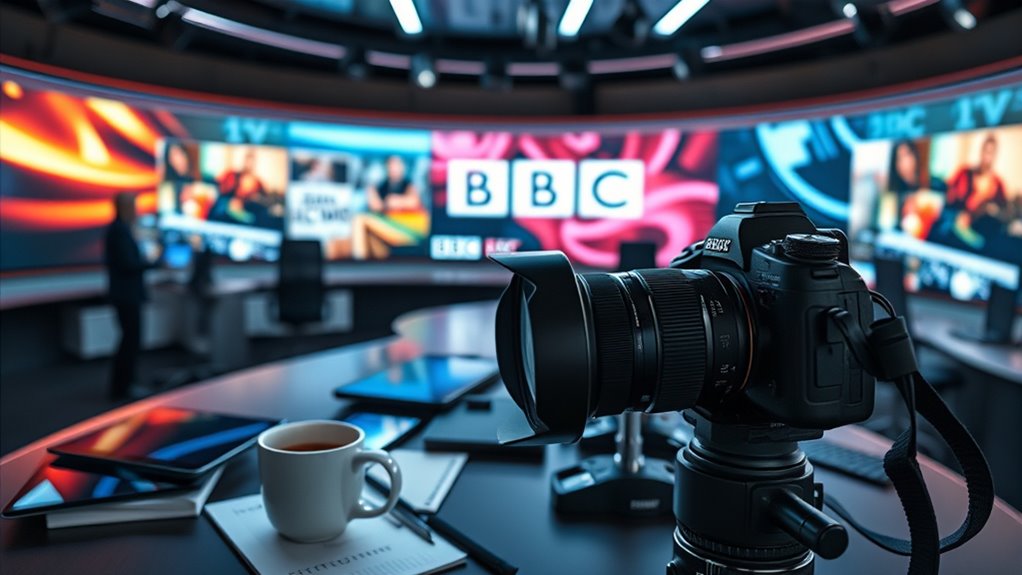The BBC has issued a warning that it may sue AI companies if they use its news content without permission. They emphasize that unauthorized use can lead to lawsuits, fines, and damages. The BBC is determined to protect its original content and warns firms against copyright infringement. Many AI firms overlook these legal issues, risking costly battles. Keep exploring to understand how this situation could impact AI development and copyright enforcement.
Key Takeaways
- The BBC has issued warnings to AI companies using its news content without permission, threatening legal action.
- Unauthorized use of BBC news articles for AI training may constitute copyright infringement, risking lawsuits and fines.
- The BBC emphasizes protecting its intellectual property rights over original news content against unauthorized data use.
- AI firms may need to obtain licensing or use alternative data sources to avoid legal repercussions.
- The situation highlights increased media industry efforts to enforce copyright laws in AI training practices.

The BBC has issued a warning that it may take legal action against AI companies for using its news content without permission to train their models. If you’re involved in AI development or rely on AI-generated content, this news should make you consider the serious copyright concerns at play. When companies scrape news articles and other media to improve their AI systems, they often overlook the legal implications tied to copyright laws. These laws are designed to protect original content from unauthorized use, and the BBC’s stance highlights the potential risks of using news content without explicit consent.
The BBC warns of legal action against AI firms using its news content without permission.
In this context, the legal implications are significant. If AI firms continue to use copyrighted news data without proper licensing, they could face lawsuits, hefty fines, and damages. The BBC’s warning signals a shift in how major media organizations are approaching their rights, signaling they’re prepared to defend their content. For AI developers, this means you need to evaluate whether your training datasets include licensed content or if you’re risking infringement. Ignoring these copyright concerns could lead to costly legal battles that delay or halt AI projects altogether.
Moreover, this situation underscores the importance of understanding the boundaries of fair use. While some argue that using news articles for training might qualify as fair use, courts tend to scrutinize such claims carefully, especially when the use directly impacts the original content’s value or revenue. The BBC’s move suggests that they believe their news articles are being used in ways that infringe on their rights, and they’re ready to challenge those uses legally. If you’re an AI company, you might need to revisit your data collection practices and seek licensing agreements or alternative data sources to avoid infringing on copyright.
For content creators and media organizations, this bold stance from the BBC serves as a warning that protecting their intellectual property is a priority. It’s a reminder that legal considerations are intertwined with technological advancements. If you’re involved with AI training, you must stay informed about evolving regulations and respect copyright boundaries. Failure to do so could not only lead to legal consequences but also damage your reputation and relationships within the industry. Additionally, understanding the scope of copyright law is essential to navigate these challenges effectively.
Frequently Asked Questions
How Might This Lawsuit Impact AI Training Practices Globally?
This lawsuit could lead you to prioritize data licensing and respect for intellectual property rights more carefully. AI firms might tighten their data collection practices, ensuring they obtain proper permissions and avoid infringing on copyrighted news content. Globally, it could set a precedent, making AI developers more cautious about using proprietary information for training, ultimately fostering a more ethical approach to data use and reducing legal risks associated with intellectual property violations.
Could Other News Organizations Follow Bbc’s Legal Actions?
You might see other news organizations jump into legal battles, driven by copyright concerns and licensing challenges. It’s no exaggeration to say this could spark a global wave of lawsuits, making AI training more complicated and costly. These organizations could follow BBC’s lead to protect their content, forcing AI developers to navigate a maze of legal hurdles. The industry’s future might hinge on how these legal actions unfold.
What Are the Potential Consequences for AI Developers and Users?
If AI developers and users ignore data licensing and copyright enforcement, they risk legal actions and financial penalties. You could face lawsuits, cease-and-desist orders, or restrictions on data use, which might delay projects or increase costs. Staying compliant means respecting copyright laws and licensing agreements, ensuring your AI training data is lawful. This proactive approach helps avoid litigation, fosters ethical practices, and sustains long-term innovation in AI development.
How Does This Issue Affect the Future of AI and Journalism?
This issue is a storm on the horizon that could reshape AI and journalism. You need to prioritize ethical sourcing and content licensing to build trust and avoid legal pitfalls. Without clear agreements, you risk drowning in uncertainty, which threatens the integrity of journalism and AI innovation. Embracing transparent, fair practices now guarantees a future where both fields grow hand-in-hand, safeguarding truth and accountability in the digital age.
Are There Existing Legal Frameworks for AI Training Data Rights?
You should know that current legal frameworks for AI training data rights are still evolving. Copyright law plays a big role, especially around data ownership and intellectual property. Some countries are developing specific regulations to clarify who owns training data and how it can be used. However, there’s no universal rule yet, so AI firms and content creators need to navigate these uncertainties carefully to avoid legal issues down the line.
Conclusion
You should know that over 80% of AI training data now includes news content, making companies like the BBC very protective. If your favorite news outlet’s stories are used without permission, it could threaten their credibility and revenue. This fight highlights the need for clearer rules around AI training data. As the BBC stands firm, it’s clear that protecting journalism’s integrity matters—because behind every story, there’s real value and trust at stake.










